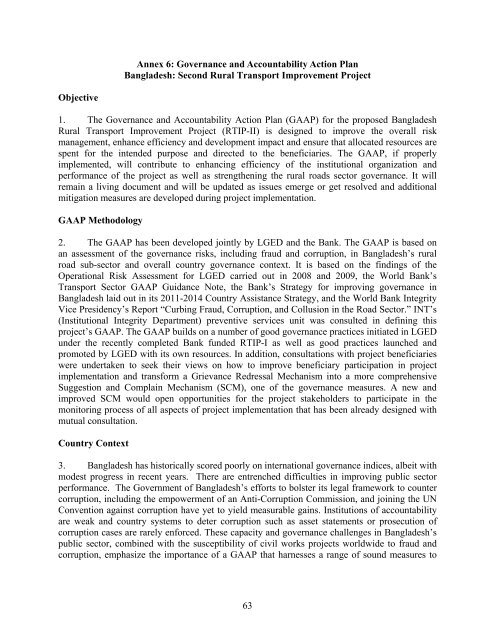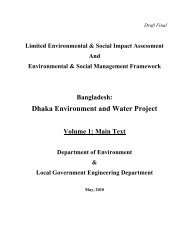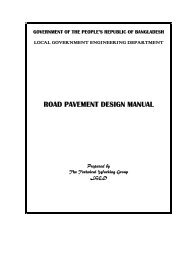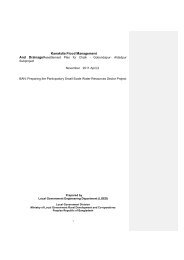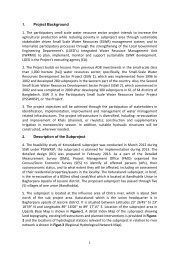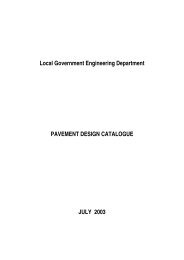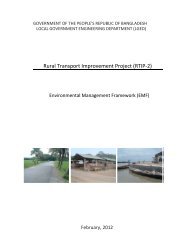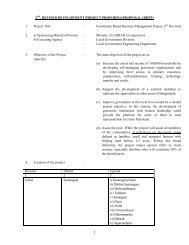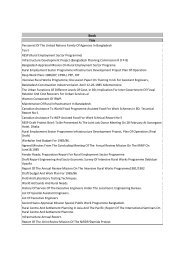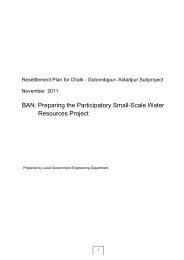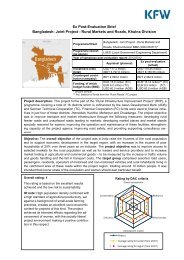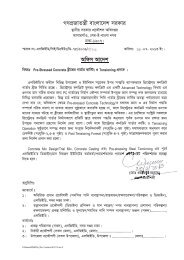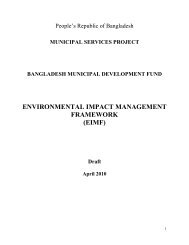PAD - LGED
PAD - LGED
PAD - LGED
You also want an ePaper? Increase the reach of your titles
YUMPU automatically turns print PDFs into web optimized ePapers that Google loves.
Annex 6: Governance and Accountability Action Plan<br />
Bangladesh: Second Rural Transport Improvement Project<br />
Objective<br />
1. The Governance and Accountability Action Plan (GAAP) for the proposed Bangladesh<br />
Rural Transport Improvement Project (RTIP-II) is designed to improve the overall risk<br />
management, enhance efficiency and development impact and ensure that allocated resources are<br />
spent for the intended purpose and directed to the beneficiaries. The GAAP, if properly<br />
implemented, will contribute to enhancing efficiency of the institutional organization and<br />
performance of the project as well as strengthening the rural roads sector governance. It will<br />
remain a living document and will be updated as issues emerge or get resolved and additional<br />
mitigation measures are developed during project implementation.<br />
GAAP Methodology<br />
2. The GAAP has been developed jointly by <strong>LGED</strong> and the Bank. The GAAP is based on<br />
an assessment of the governance risks, including fraud and corruption, in Bangladesh’s rural<br />
road sub-sector and overall country governance context. It is based on the findings of the<br />
Operational Risk Assessment for <strong>LGED</strong> carried out in 2008 and 2009, the World Bank’s<br />
Transport Sector GAAP Guidance Note, the Bank’s Strategy for improving governance in<br />
Bangladesh laid out in its 2011-2014 Country Assistance Strategy, and the World Bank Integrity<br />
Vice Presidency’s Report “Curbing Fraud, Corruption, and Collusion in the Road Sector.” INT’s<br />
(Institutional Integrity Department) preventive services unit was consulted in defining this<br />
project’s GAAP. The GAAP builds on a number of good governance practices initiated in <strong>LGED</strong><br />
under the recently completed Bank funded RTIP-I as well as good practices launched and<br />
promoted by <strong>LGED</strong> with its own resources. In addition, consultations with project beneficiaries<br />
were undertaken to seek their views on how to improve beneficiary participation in project<br />
implementation and transform a Grievance Redressal Mechanism into a more comprehensive<br />
Suggestion and Complain Mechanism (SCM), one of the governance measures. A new and<br />
improved SCM would open opportunities for the project stakeholders to participate in the<br />
monitoring process of all aspects of project implementation that has been already designed with<br />
mutual consultation.<br />
Country Context<br />
3. Bangladesh has historically scored poorly on international governance indices, albeit with<br />
modest progress in recent years. There are entrenched difficulties in improving public sector<br />
performance. The Government of Bangladesh’s efforts to bolster its legal framework to counter<br />
corruption, including the empowerment of an Anti-Corruption Commission, and joining the UN<br />
Convention against corruption have yet to yield measurable gains. Institutions of accountability<br />
are weak and country systems to deter corruption such as asset statements or prosecution of<br />
corruption cases are rarely enforced. These capacity and governance challenges in Bangladesh’s<br />
public sector, combined with the susceptibility of civil works projects worldwide to fraud and<br />
corruption, emphasize the importance of a GAAP that harnesses a range of sound measures to<br />
63


